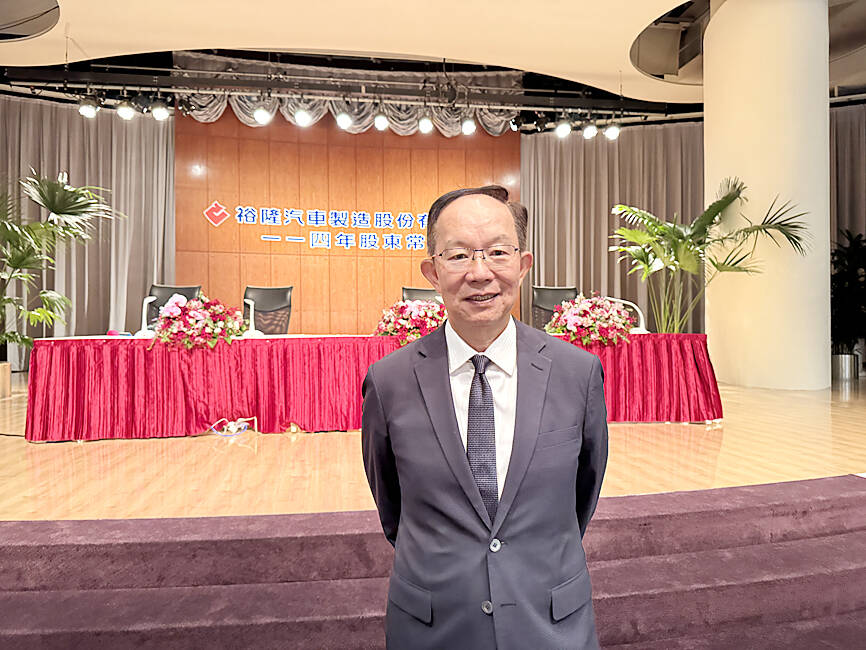Yulon Motor Co (裕隆汽車) yesterday said it is seeking to boost contract car manufacturing business and accelerate energy business development as tariff uncertainties undercut its profit in the second quarter.
The automaker reported a 73 percent slump in net profit to NT$116 million (US$3.83 million), from NT$435 million in the first quarter. Earnings per share were NT$0.11, down from NT$0.42.
Yulon said consumers have been hesitant to buy new cars amid tariff policy uncertainties and speculations about commodity tax cuts.

Photo: Amy Yang, Taipei Times
Taiwan’s new vehicle sales dipped 14.4 percent year-on-year to 198,959 units in the first half of this year.
“Under such political, economic and tariff-related circumstances, our manufacturing is certainly affected,” Yulon president Hsu Kuo-hsing (許國興) said at an investors’ conference.
The company has formulated four major strategies, including optimizing its car manufacturing scale and vying for new contract orders, Hsu said.
The company is also seeking to assemble more Nissan Motor Co cars in Taiwan, he said.
The company’s major customers for contract manufacturing services include Yulon Nissan Motor Co (裕隆日產) and Foxtron Vehicle Technologies Co (鴻華先進). Foxtron is an electric car venture between Yulon and Hon Hai Precision Industry Co (鴻海精密), which is known as Foxconn overseas.
Yulon is also stepping up efforts to expand its new energy business via its car financing subsidiary Yulon Finance Corp (裕融), which owns renewable energy company Shinshin Credit Corp (新鑫). The energy business currently accounts for a small revenue share.
Shinshin operates more than 400 solar energy plants and has a license to retail green energy. It also operates an energy storage business along with an electric vehicle charging and battery business in Taiwan, as well as energy storage in the US and the Philippines.
Yulon would also be looking to revitalize its overseas assets and expand its energy, car financing, car leasing and secondhand vehicle businesses overseas, targeting Southeast Asian markets such as the Philippines and Malaysia, Hsu said.
Separately, Yulon subsidiary China Motor Corp (中華汽車) maintained this year’s sales target of 49,000 units — half from its CMC-branded vehicles and another half from Mitsubishi Motors Co and MG Motor Corp cars it helps assemble — despite the tariff uncertainty, company spokesman Chien Ching-wu (錢經武) said.
The company plans to introduce a new MG model this quarter, Chien said.
Yulon would manufacture the seven-seater MG 50 itself on a contract basis, rather than China Motor manufacturing it like previous MG vehicles, he said.
China Motor is 8.05 percent owned by Yulon and 25 percent owned by Tai Yuen Textile Co (台元紡織), the biggest stakeholder of Yulon.
The company’s net profit grew 11.3 percent to NT$700 million in the second quarter from NT$629 million in the first quarter. Earnings per share rose to NT$1.28 from NT$1.15.

Taiwan Semiconductor Manufacturing Co (TSMC, 台積電) last week recorded an increase in the number of shareholders to the highest in almost eight months, despite its share price falling 3.38 percent from the previous week, Taiwan Stock Exchange data released on Saturday showed. As of Friday, TSMC had 1.88 million shareholders, the most since the week of April 25 and an increase of 31,870 from the previous week, the data showed. The number of shareholders jumped despite a drop of NT$50 (US$1.59), or 3.38 percent, in TSMC’s share price from a week earlier to NT$1,430, as investors took profits from their earlier gains

In a high-security Shenzhen laboratory, Chinese scientists have built what Washington has spent years trying to prevent: a prototype of a machine capable of producing the cutting-edge semiconductor chips that power artificial intelligence (AI), smartphones and weapons central to Western military dominance, Reuters has learned. Completed early this year and undergoing testing, the prototype fills nearly an entire factory floor. It was built by a team of former engineers from Dutch semiconductor giant ASML who reverse-engineered the company’s extreme ultraviolet lithography (EUV) machines, according to two people with knowledge of the project. EUV machines sit at the heart of a technological Cold

Taiwan’s long-term economic competitiveness will hinge not only on national champions like Taiwan Semiconductor Manufacturing Co. (TSMC, 台積電) but also on the widespread adoption of artificial intelligence (AI) and other emerging technologies, a US-based scholar has said. At a lecture in Taipei on Tuesday, Jeffrey Ding, assistant professor of political science at the George Washington University and author of "Technology and the Rise of Great Powers," argued that historical experience shows that general-purpose technologies (GPTs) — such as electricity, computers and now AI — shape long-term economic advantages through their diffusion across the broader economy. "What really matters is not who pioneers

TAIWAN VALUE CHAIN: Foxtron is to fully own Luxgen following the transaction and it plans to launch a new electric model, the Foxtron Bria, in Taiwan next year Yulon Motor Co (裕隆汽車) yesterday said that its board of directors approved the disposal of its electric vehicle (EV) unit, Luxgen Motor Co (納智捷汽車), to Foxtron Vehicle Technologies Co (鴻華先進) for NT$787.6 million (US$24.98 million). Foxtron, a half-half joint venture between Yulon affiliate Hua-Chuang Automobile Information Technical Center Co (華創車電) and Hon Hai Precision Industry Co (鴻海精密), expects to wrap up the deal in the first quarter of next year. Foxtron would fully own Luxgen following the transaction, including five car distributing companies, outlets and all employees. The deal is subject to the approval of the Fair Trade Commission, Foxtron said. “Foxtron will be